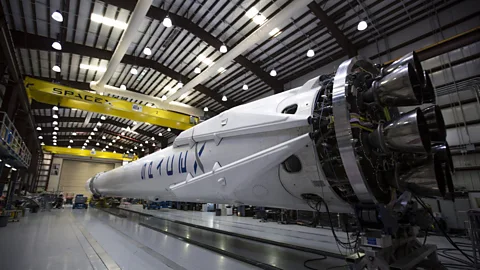Inside story of Elon Musk's space dream
 SpaceX
SpaceXThe best of the week’s reads in science and technology, including Elon Musk’s ambitious space plan, and the disastrous birth of weather forecasting.
Economy | The London hipster economy
When the banks tanked, the hipsters kept Britain going. The “flat white economy” of tech, marketing and media makes up 8% of British GDP – “the size of the car manufacturing and oil and gas industries combined”. Much of it squeezes into Shoreditch. “Between 2012 and 2014, more businesses were created in the single London postcode of EC1V than in the whole of Manchester and Newcastle put together.” (Felix Martin, New Statesman, 950 words)
Philosophy | Confessions of a bitter cripple
Disabled philosopher, Elizabeth Barnes, wrestles with ideas about the value of life: “I have sat in philosophy seminars where it was asserted that I should be left to die if the choice was between saving me and saving a non-disabled person. I have been told that, while it isn’t bad for me to exist, it would’ve been better if my mother could’ve had a non-disabled child… It’s a strange thing to construct arguments for the value of your own life.” (Elizabeth Barnes, Philosop-her, 1,180 words)
Weather | Watchers of the skies
Dismayed by a storm in 1859 that sank 133 ships, Robert FitzRoy, first head of the British government’s Meteorological Department, “took it upon himself to issue bespoke weather warnings, for which he coined the term ‘forecasts’”. It did not go well. The first forecasts attracted so much derision that FitzRoy “locked himself in his dressing room and cut his throat with a razor”. The Met Office abandoned forecasting for decades. (Richard Hamblyn, TLS, 1,414 words)
Scientific method | The trouble with scientists
Scientists suffer from cognitive biases just like everybody else. The scientific method is supposed to catch and correct such biases, but it is failing to do so. Why? Because to advance as a professional scientist you must publish; learned journals want to publish positive results, not negative ones; so confirmation bias is strengthened; and peer review slows the rate at which wrong claims can be contradicted. (Philip Ball, Nautilus, 3,160 words)
Space | Elon Musk’s space dream
“In late October 2001, Elon Musk went to Moscow to buy an intercontinental ballistic missile.” A great first sentence, and the rest of the piece bounces along with similar energy, telling how Musk made himself an expert on space technology, hired the future head of Nasa, built rockets, and drew up a business plan for settling Mars; while juggling, and almost dropping, his electric-car making start-up, Tesla. (Ashlee Vance, Bloomberg Businessweek, 8,900 words)
Suicide | The male suicides
In all countries of the world, more men commit suicide than women. What shapes this consistent pattern? Rory O’Connor has been studying suicides for two decades and thinks that mental illness and depression are not the answer. Suicidal men feel responsible for what is “social perfectionism”, the need to match what they think people expect of them. This is the clue to the psychology of the suicidal mind. (Will Storr, Mosaic Science, 4,882 words)
Ray Li explains in plain English the top 10 most influential data mining algorithms as voted on by three separate panels. Full of “a-ha” moments as the tropes which pursue you through the internet all day are reunited with their parent algorithms. The Apriori algorithm, for example, is what tells Amazon to offer us an umbrella if we have just bought a guide to Great Britain. (Ray Li, 6,200 words)
For more articles worth reading, visit The Browser. If you would like to comment on this, or anything else you have seen on Future, head over to our Facebook or Google+ page, or message us on Twitter.
